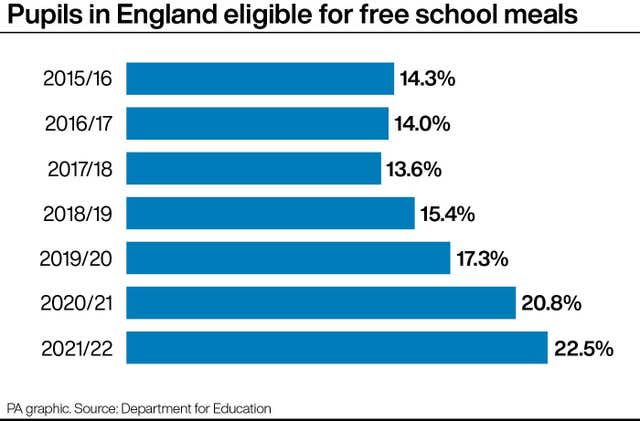Headteachers have criticised a “shocking” rise in the number of pupils eligible for free school meals.
Government figures released on Thursday show that 22.5% of youngsters are currently eligible for free school meals, up from 20.8% in 2021 and representing just under 1.9 million children.
Julie McCulloch, policy director at the Association of School and College Leaders, said it is “shocking that in one of the world’s wealthiest economies we are seeing a very significant increase in the number of children eligible for free school meals, and therefore living in extremely difficult financial circumstances”.

She said the union recognises that the rise is “at least partly due” to transitional protections over a change in benefit payments, linked to free school meals eligibility, but added that it is “also likely that we are seeing the economic impact of the pandemic on many families affected by illness and job losses”.
“Their circumstances will become even more severe because of the cost-of-living crisis,” she said.
The proportion of pupils receiving free school meals in England has risen from around one in seven in 2015/16 to more than one in five in 2021/22.
The Government said that on April 1 2018, transitional protections were put in place for the rollout of Universal Credit, which meant pupils eligible for free school meals on or after that date retained their eligibility even if their circumstances changed.
“Prior to the pandemic, this had been the main driver in the increase in the proportion of pupils eligible for free school meals as pupils continue to become eligible but fewer pupils stop being eligible,” it said.
Ms McCulloch, of the ASCL, said it is “even more shocking” that current eligibility “does not even capture all the children who need help”.
“Free school meal eligibility now applies to 22.5% of pupils, but we know that the level of child poverty is about 30%,” she said.
She added that her union is campaigning for all children whose families are in receipt of Universal Credit to be eligible for free school meals.
“But the Government must also recognise the pressing need to do more for these children and their families in general,” she said.
“It is simply unacceptable that so many young people live in such difficult circumstances, and it has a huge impact on their education as they are less likely to be ready to learn if their families are struggling to provide them with basics such as a nutritious diet.”
Analysis by the Child Poverty Action Group of the figures revealed that one in three schoolchildren living in poverty in England were missing out on free school meals – 800,000 children.
The CPAG said that the low threshold for free school meals of an annual household income of £7,400 after tax excluding benefits meant that many disadvantaged children were not entitled to free school meals despite being unable to meet the costs.
Kate Anstey, head of the UK Cost of the School Day programme at Child Poverty Action Group, said: “We know families are being left to make impossible decisions, with many parents simply unable to afford lunches but desperately not wanting their children to go without.
“Food is vital to children’s health, wellbeing and learning, and the government cannot continue to stand by while children in poverty go hungry at lunchtime. No other part of the school day is means-tested in this way – universal free school meals should simply be a fundamental part of going to school.”
The proportion of pupils from ethnic minority backgrounds in secondary schools is over a third in 2021/22 with 34.1% coming from ethnic minority backgrounds compared with 33.1% in 2020/21.




Comments: Our rules
We want our comments to be a lively and valuable part of our community - a place where readers can debate and engage with the most important local issues. The ability to comment on our stories is a privilege, not a right, however, and that privilege may be withdrawn if it is abused or misused.
Please report any comments that break our rules.
Read the rules here